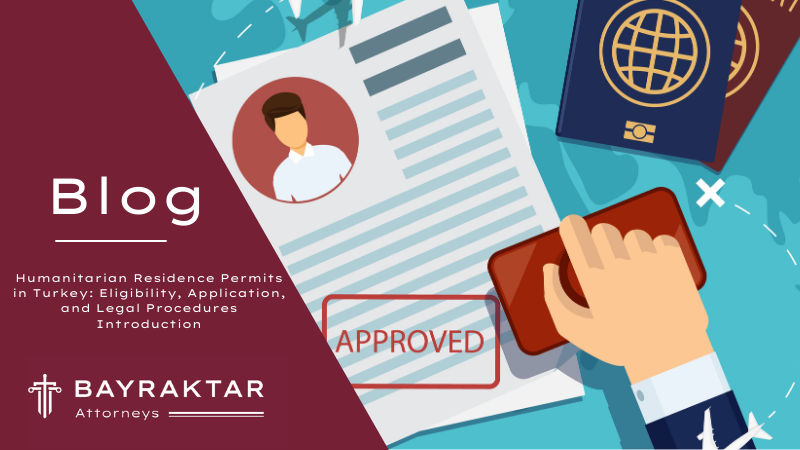
Humanitarian Residence Permits in Turkey: Eligibility, Application, and Legal Procedures
The issuance of humanitarian residence permits in Turkey is subject to specific conditions outlined in Article 46 of the Law on Foreigners and International Protection, with a limited number of situations where such permits may be granted.
In this blog post, we will explore the eligibility criteria and legal procedures for obtaining humanitarian residence permits in Turkey, along with important considerations regarding application, transitions between different types of residence permits, and the legal recourse available in cases of rejection or cancellation.
Situations Eligible for Humanitarian Residence Permits:
Humanitarian residence permits are granted in the following limited situations, as specified in Article 46 of the Law on Foreigners and International Protection:
- When the best interests of a child are at stake, a humanitarian residence permit may be issued to the child’s parents or guardians.
- Foreign nationals subject to deportation or entry bans in Turkey, who cannot be deported or are not expected to leave Turkey, may be eligible for a humanitarian residence
- Foreign nationals who cannot be subject to deportation pursuant to Article 55 of the Law may also apply for a humanitarian residence
- Individuals who have appealed against or are in the process of appealing decisions regarding deportation, refusal of international protection status, or withdrawal or deemed withdrawal of
such status, may be granted a humanitarian residence permit until the finalization of the judicial process.
- In cases where urgent humanitarian reasons, public interest, and public order require, foreign nationals may be allowed to enter and stay in Turkey with a humanitarian residence permit. However, in such cases, it is a prerequisite that the foreign national is unable to obtain any other type of residence permit due to circumstances that hinder the issuance of other residence
permits, such as short-term residence permits, student residence permits, family residence permits, or residence permits for victims of human trafficking.
Additionally, the law allows for humanitarian residence permits in extraordinary situations, although the specific definition of “extraordinary” circumstances is not provided. Therefore, a case-by-case assessment will be conducted based on the unique characteristics of each situation.
Where to Apply for Humanitarian Residence Permits:
As per Article 46 of the Law on Foreigners and International Protection, applications for humanitarian residence permits must be submitted to the provincial migration management authority within the jurisdiction of the relevant governorship.
It is essential to note that the issuance of humanitarian residence permits requires approval from the Ministry of Interior, and these permits may be canceled or not extended once the conditions necessitating their issuance cease to exist.
Transitions Between Residence Permits:
Foreign nationals who hold a residence permit based on one type of reason but no longer meet that reason’s criteria or have a different valid reason may apply for a residence permit in line with their new purpose of stay.
For example, a foreign national with a student residence permit may apply for a family residence permit after completing their studies, followed by the possibility of obtaining a long-term residence permit. This transition between residence permits is considered permissible.
Additionally, a foreign national holding a humanitarian residence permit may transition to a family residence permit if they marry a Turkish citizen or meet the requirements for obtaining Turkish citizenship through marriage.
However, it is important to note that there are no provisions for transitioning from a humanitarian residence permit to a long-term residence permit as specified in Article 42 of the Law.
Issuance, Extension, or Cancellation of Humanitarian Residence Permits:
The procedures for humanitarian residence permits are initiated upon the request of the Directorate General or the governorship. The governorship evaluates whether the conditions warranting the issuance of a humanitarian residence permit still exist within the permit’s validity period.
Once the conditions cease to exist, humanitarian residence permits may be canceled or not extended. The governorship, in line with the Ministry’s approval, informs the foreign national at least fifteen days before the expiration of their residence permit regarding its cancellation or non-renewal.
Legal Recourse in Case of Rejection or Cancellation:
Decisions to reject the application for a humanitarian residence permit or to cancel a humanitarian residence permit are considered administrative actions. Therefore, individuals can initiate a cancellation lawsuit against these administrative actions.
Before filing a lawsuit, it is possible to lodge an objection against the rejection or cancellation decision with the relevant administrative authority. In cases where the administrative authority remains silent regarding the objection, a cancellation lawsuit can be filed with the competent administrative court within thirty days.
Jurisdiction and Competent Court:
In cases of rejection of a humanitarian residence permit application or the cancellation of a humanitarian residence permit, administrative courts have jurisdiction. The competent court is the administrative court within the jurisdiction of the governorship that issued the decision.
Therefore, if your application for a humanitarian residence permit is rejected or your permit is canceled, you should file a lawsuit with the administrative court in the jurisdiction of the relevant governorship.
For legal assistance and guidance related to humanitarian residence permits in Turkey, please feel free to contact Bayraktar Attorneys, where our experienced legal team can provide expert advice and representation throughout the application and appeals process.
Recently Added Blogs



.png)
.png)
.png)
.png)
